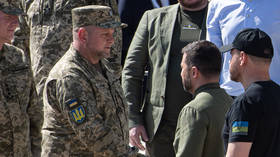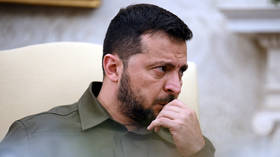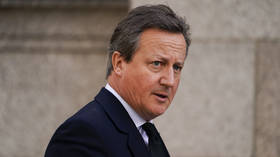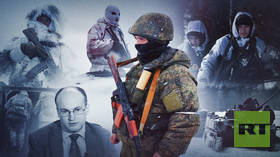The knives are out in Kiev: Once Ukraine loses the war, its elites will eat each other alive

The long-simmering conflict between Ukraine’s two most important figures – that is, President Vladimir Zelensky, and its military commander-in-chief, General Valery Zaluzhny – is escalating. The usual denials ring hollower than ever, especially the usual attempts to blame “the Russians.”
Zelensky has spoken of his “working relationship” with his top general; and he won’t comment on their conflicts and the incessant rumors about Zaluzhny’s impending dismissal, because that would “help the enemy.” In politico-talk, that is the equivalent of admitting that your marriage is ready for divorce and maintained merely not to feed the neighbors’ gossip.
If Churchill once joked that Soviet high politics resembled bulldogs fighting under a rug, he would have found Kiev’s military-civilian wrangling intriguingly bereft of any cover at all. Only a few weeks ago, Zaluzhny and Zelensky clashed publicly when the general admitted that the war against Russia had become a “stalemate.” In reality, that was an understatement, but it was still too much realism for the president.
The latest sign of how intense the infighting has become is a wire-tapping scandal. On 17 December, one of Zaluzhny’s offices was found to be bugged. According to the Ukrainian authorities, the device was not working, and its origins could not be identified, both of which are politically convenient assessments. More listening devices were discovered in the offices of Ukraine’s General Staff.
Tellingly, Ukrainian media has not responded by unanimously blaming Russian espionage. Instead, speculation about internal power struggles is common, including suspicions that the bug was to serve only as a prelude to future AI-generated deep fakes of Zaluzhny’s voice. Yes, that’s how much trust there is in the Ukrainian political sphere.
Other commentators connect the bugging attempt to a recent murky affair involving the sudden death of Major Gennady Chastyakov, a top Zaluzhny aide. Officially labeled an accident, Chastyakov’s bizarre end, involving a birthday present of a bottle of Whiskey and live hand grenades, makes more sense as an assassination.
Some suggest that the wiretap was an attempt by team Zelensky to discredit Zaluzhny and the General Staff – for instance by insinuating that the counteroffensive failed due to leaks from the armed forces command. Others, again, see the military, and maybe its intelligence service under the sinister Lieutenant General Kirill Budanov, behind a false-flag operation to smear the president and his men. Who knows? The point is that this type of speculation now comes naturally in Ukraine.
It is not hard to guess at some of the background of this scandal: Ukraine’s elite is under increasing pressure. There is a looming defeat in the war with Russia. Zelensky, as well as Aleksey Danilov, the secretary of Ukraine’s National Security and Defense Council, have admitted the failure of this summer’s counteroffensive.
Meanwhile, in the West, even the Washington Post, a mouthpiece of US foreign-policy militancy, has recently struck a sober tone. A detailed piece of reportage has revealed that the counteroffensive fiasco really consisted of not one but two strategic failures. First – and quickly – the NATO tactics playbook imposed by the West proved unworkable; then, and over a longer period of slow, grinding decimation, the Ukrainian attempt to replace NATO fantasies with some of their own also got, literally, nowhere. War retains its element of Clausewitzian chance and unpredictability – a deadly game of neither, in the old master’s words, chess nor Roulette, but of cards – but Kiev’s hand is now weaker than ever.
At the same time, Ukraine’s so-called friends are getting ready to cut their losses. It is true that Zelensky has just been thrown the largely symbolical sop of formal EU entry negotiations. And, depending on how various quid pro quos will work out (or not) – between the White House and the Republicans in the US, and between Hungary’s Viktor Orban and the rest of the EU – Kiev may still even receive one more round of large-scale aid.
But even now, some EU leaders are already hedging. Ireland’s Leo Varadkar could hardly wait to stress that Ukraine won’t be a full member any time soon. If ever, one should add. And regarding the money, what really matters is the fact that the flow of aid is now up for fierce contestation. Helping Ukraine is no longer a sacrosanct cause. Against the background of the counteroffensive’s comprehensive failure, the West’s proxy war investment will end one way or the other, and if not soon, then not much later. President Joe Biden’s language has shifted from “as long as it takes” to “as long as we can.” That is remarkably honest, for Biden. It’s aid game over, if not today, then tomorrow.
And remember what this was all about, NATO membership? Zelensky has now come to admit that that would be a nice thing, but it’s not happening. “They are not inviting us.” All “signals” to the contrary, he has finally understood, are “nonsense” about “somewhere, sometime” and “nothing concrete.” He has also rejected odd recent speculation about just a “part” of Ukraine joining (because Kiev and the West won't acknowledging territories claimed and controlled by Russia as Russian anytime soon). In short, he sounds exactly like people who were derided as Russia stooges only, it seems, yesterday.
What a message for the families of the hundreds of thousands of Ukrainians dead because the Zelensky regime could not conceivably concede Ukrainian neutrality before February 2022, or for that matter, in March or April of that year. What a price to have paid for a narcissistic comedian’s flat learning curve. Some “Servant of the People” indeed.
Western aid is absolutely vital for Kiev. Once the bulk of it is withdrawn, Ukraine will have to make peace on Russian terms or suffer an even worse defeat. Indeed, its government may face collapse or rebellion – Ukraine is after all, a country of Maidans – and the state may lose elementary capacities, such as keeping its bureaucracy paid, not to speak of more ambitious programs.
Against this background, the mounting tension between the generals and the politicians is no surprise. Someone must be blamed for the counteroffensive’s failure and unnecessary losses, for the fact that Kiev has trusted “friends” who have – very predictably – used Ukraine as a pawn on their grand geopolitics chessboard, and for, last but not least, the fact that peace was not made when it was within reach in spring 2022.
Not to mention missing opportunities to entirely avoid the war.
Zelensky is no slouch at the blame game. He has pointedly remarked that Zaluzhny “must answer for results at the front,” while he’s expecting “solutions” and “very concrete things on the battlefield” from the military. As if war was a matter of “bad service” by the soldiers.
But Zelensky’s rivals and would-be successors can give as good as they get. If the days when aid for Ukraine was sacrosanct in the West are over, so is Zelensky’s status as an untouchable war leader at home. The former boxing champion and now mayor of Kiev, Vitali Klitschko, is sensing a knock-out and has publicly accused the president of authoritarianism and failures in the war. He has also stressed that once the fighting is over, everyone, including the president, will have to answer for their mistakes. What a prospect, especially when it’s a lost war. Churchill, with whom Zelensky’s performance has absurdly been compared, lost an election even after winning one. Clearly, there is blood in the water of Ukrainian domestic politics and the sharks are circling.
Zaluzhny, meanwhile, has gone on the offensive, too, not against the Russians, but his own president. The general could not the courage to mention that he didn't quite agree with Zelensky’s purge of military-mobilization officials in August. Now Zaluzhny says these people were “professionals” who knew their jobs. Surely, he can’t be implying that the president who fired them does not!
Behind this crude swipe at his boss, the commander-in-chief is broaching a serious issue. Mobilization, like aid from abroad, is a Ukrainian Achilles' heel under extreme tension. It is slowing down badly, as has been acknowledged by, for instance, Sergey Rakhmanin, an influential journalist who is also a member of parliament and of its Committee on Matters of National Security, Defense, and Intelligence. Meanwhile, the army is asking for another 450,000 to 500,000 fresh recruits.
How they will find the equivalent of roughly €12 billion to finance this fresh mobilization round, if it happens, is unknown.
Zelensky is reassuring the public that he won’t sign a law to mobilize women, but that he is open to lowering the draft age. What Ukraine’s most influential weekly, Zerkalo Nedeli, calls the most important questions, namely demobilization and leave, remain unanswered.
What is making recruiting fresh cannon fodder harder is the fact that two things are becoming obvious, no matter what Ukraine’s thoroughly controlled media does to cover them up. The war is being lost, and sacrificing ever more men and women is not only in vain but, actually, rather treasonous, because it does not serve Ukraine's future interests.
Peace would – preferably one concluded more than a year ago.
Instead, this is a sacrifice that serves the strategies of American neocons and their European followers. And, on top of that, those strategies are failing.
Kiev’s elites are staking out their positions for the end game.
Not of the war against Russia, but against each other once the fighting ends with bitter popular disappointment.
Their ruthless fractiousness is nothing new, it's just a reversion to normal. But independent Ukraine has never experienced what is likely to come soon – a perfect storm of large-scale defeat, being abandoned by “allies” who have bled the country dry, and widespread dissatisfaction as never before.
A Maidan might not be enough this time.
The statements, views and opinions expressed in this column are solely those of the author and do not necessarily represent those of RT.

















